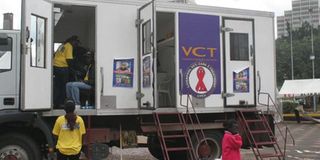New technology by Kemri to enable safe conception by HIV positive people

A mobile VCT centre. Kemri has developed a new technology that will allow HIV positive men and women to biologically bear children without infecting their HIV negative partners.FILE PHOTO | NATION MEDIA GROUP
What you need to know:
- Vaginal insemination will allow HIV positive women to conceive without infecting their partners.
- HIV positive men will be in a position to bear children without infecting their partners through “sperm washing”.
- The new technologies will be rolled out by the Kenya Medical Research Institute (Kemri) in June 2015.
- The advantage of the vaginal insemination is that it can be done by the couples at home after being trained by the health workers.
Women living with HIV can now conceive without infecting their partners thanks to a new technology known vaginal insemination.
Likewise, HIV positive men will be in a position to bear children without infecting their partners through an Aids prevention method which researchers have called “sperm washing”.
The new technologies to be rolled out by the Kenya Medical Research Institute (Kemri) in June, seek to address the desire by discordant couples to have biological children.
The country has 260,000 discordant couples, according to the Kenya HIV Estimates Technical 2013 and Modes of Transmission report 2008.
According to the study 21 per cent of new adult infections occurred among young women aged 15-24 who have growing desire to have children.
In the new study by Kemri, the vaginal insemination will involve sperm being collected from a man into a non-lubricated condom or a cup.
It will then be taken from the condom and gently inserted inside the woman’s birth canal using a needleless syringe.
The procedure can be done either by the man or the woman.
SPERM WASHING
Sperm 'washing’, according to Kemri, is a means of HIV prevention which involves the collection of semen from a man who is HIV positive.
The semen is washed in the laboratory to remove the virus.
The washed sperm will then be placed inside the woman through intrauterine insemination (IUI).
Prof Elizabeth Bukusi, one of the principal investigators in the study and deputy director in-charge of research and training at Kemri, said that the method is applicable to discordant couples.
Prof Bukusi said that the study whose findings will be released on June 2, 2015 was conducted between 2012 and 2014 in sections of Kenya.
Already, a number of mothers involved in the study have given birth to HIV free children, said Prof Bukusi in an interview with the Nation Tuesday.
She said 75 per cent of the women attained pregnancy after six months.
“These are other tools to add in HIV preventions and interventions to reduce new infections,” Prof Bukusi said.
The advantage of the vaginal insemination is that it can be done by the couples at home after being trained by the health workers.





